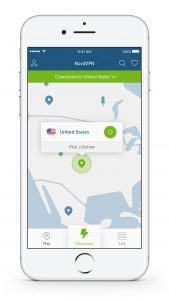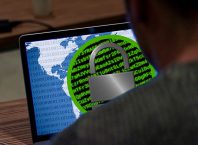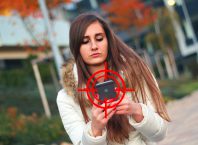What is a VPN? It’s an absolute essential today to prevent identity theft and protect your internet privacy. It stands for Virtual Private Network, and as you’re about to see, you simply must have a quality VPN today if you use your cell phone, computer, or tablet to access the Internet.
Below you’ll see the #1 recommendation for The Best VPN … the 5 top reasons on Why to Use a VPN … and 8 key tips on How to Choose a VPN. But first you need to know:
How a VPN Works
In order to keep your privacy, financial information, and identity safe, you need to know the basics on how a VPN works.
When you computer or device connects to a website, it sends and receives data to and from that website. So imagine a long pipe running from your computer to that website.
Anything you type in your browser on the web page will get sent through that pipe to the website you are working with. The data you send may include your name, account numbers, password, phone number, social security number, and more.

You want to be 100% certain, therefore, that all your data you are sending is “encrypted,” which basically means it’s heavily scrambled — converted into a bunch of code that looks like gibberish to human beings and is incredibly difficult to decipher.
The website to which you want to send your personal data has the right tools to understand this encryption (to translate that long secret code). Others do not.
Unfortunately though — if you do not have a quality VPN — your personal information may very often NOT be encrypted.
In other words… the personal data you send may be at very high risk without a VPN.
That’s because anyone with access to the network — the “pipe” you are sending your private data through — could also view and steal your data.
And it can be quite easy for others to get access to that network or “pipe,” especially if you’re anywhere out in public!

It’s kind of like this: Imagine you are on a conference call. There may be anywhere from a few to dozens of people listening in on that call, and you have NO IDEA who or where all of those people are.
On that call, would you just share your sensitive private information like your account numbers and passwords out loud with everyone? HECK NO, you wouldn’t!
You absolutely need a high-quality VPN because it automatically encrypts all of the data you send, so that ONLY the intended website at the other of the pipe can understand it.
A VPN is, in the most basic terms, a highly sophisticated scrambling device.
It’s even more important for you because there are hackers out there who may otherwise not only grab the private data you’re sending to commit identity theft — they may even then find their way through those “pipes” back to all of the other data on your computer!
THE TOP 10 THREATS YOU FACE IN 2018
Instantly see the 10 highest-probability dangers you face if you live in the USA, and how to best protect yourself.
No fear-mongering. No hype. Just the crucial facts.
The Annual U.S. Report from YouDefense.com. Yours Free Today:
Why to Use a VPN
Now that you know what a VPN is, here are the top 5 reasons you need it:
- A VPN is key to protect you from identity theft and privacy invasions. That’s because it encrypts all the personal data you send over the Internet via your cell phone, computer, or tablet (wherever you install the VPN), protecting you from hackers and thieves.
- A VPN stops your Internet service provider from snooping on you. All the data from whatever devices you use to access the Internet flows through your Internet service provider, such as Comcast or AT&T. They can, and do, monitor your private traffic. They might even use your data to slow down certain types of traffic such as Netflix. A high-quality VPN prevents your Internet service provider from snooping on your traffic!
- A VPN stops strangers from knowing your location by “masking” it. If you are not comfortable with strangers knowing exactly where you (or your loved ones) are, use a high-quality VPN on whatever devices you use to access the Internet! Because when you do, it makes it seem like you are located where ever the VPNs servers are — such as in Europe or a completely different part of the US.
- A VPN keeps you anonymous. Unless you use a top VPN, when you connect to another website, that website can see the “address” of the computer you are coming from.This address can identify you and the Internet service provider you are using. When you use a quality VPN, though, all your data goes through the VPN provider’s server – your address is therefore hidden and can not be traced back to your computer.
- You can access blocked sites internationally. If you travel to other countries, you will notice many of them block certain websites such as Facebook or Twitter. A top VPN can enable your access to those websites when you’re in those countries.
How to Choose a VPN
 You need to know that when you use a VPN, you are placing your trust in the VPN provider to keep your data safe, as all of your data passes through their servers.
You need to know that when you use a VPN, you are placing your trust in the VPN provider to keep your data safe, as all of your data passes through their servers.
Unfortunately, there are many “shady” VPN providers out there.
Because of this, be VERY cautious with free VPN services, and even those that charge for the service. If you choose to find one on your own, make sure you research VPN providers very carefully.
Here’s some key information you need to be aware of from the Federal Trade Commission before choosing and downloading any VPN:
- Carefully review what permissions the VPN app requests of you.
- Many of the free VPN apps are free because they share your info with 3rd parties.
- Other free VPN apps are free because they sell advertising within the apps.
- Many VPNs do NOT actually encrypt all your information — research carefully.
- VPN apps may not make you entirely anonymous.
Here at YouDefense.com we’re committed to keeping you safe, so we also highly recommend you consider the following when choosing the best VPN:
- Be Extra Careful with Free VPNs. Free VPNs have to pay their bills somehow. That’s why, per the Federal Trade Commissions guidelines above, they may sell your browsing history to 3rd parties. Or they may hit you with many ads that other businesses have paid them to promote to you.
- How Many Servers Does the VPN Have? The more servers the VPN provider has, typically the faster their speed and the greater their reliability for you.
- Does the VPN Limit Your Use? Does the VPN service provider limit the amount of data you can send on a monthly basis? By how much?
- Do They Provide Apps for ALL Your Devices? Does the VPN service provide apps for your iPhone or Android device as well as your computer and/or tablet?
- Do They “Log” Your Activity (a NO-NO!) Many VPN providers store logs of your traffic and/or data. BE SURE you choose a “no-logging” VPN for maximum safety and privacy!
- Do They Allow Simultaneous Connections? Can your cell phone and computer, for example, be online at the same time and still be using the service to stay protected?
- Do They Issue a “Warrant Canary”? A warrant canary is a statement that a VPN service provider should use to inform its users that it has not been served with a secret government subpoena. This is a way to for you to know if a government entity is seeking to find information regarding the VPN’s customers.
- Where is the VPN’s Corporate Offices Located? Because the VPN service provider is subject to laws and regulations of its home country, make sure you TRUST where it is located!
The Best VPN
Given all the key information on VPNs above, including why to use a VPN and how to choose one, this is the #1 recommendation for the best VPN:
#1: NordVPN
When it comes to being trustworthy, keeping you safe on all fronts, ease of installation and use, and affordability, NordVPN is the best VPN.

NordVPN currently has 3,357 servers in 60 countries and offers applications for all major OSs including Windows, MacOS, iOS and Android.
In addition, NordVPN provides additional features such as their CyberSec feature which blocks dangerous websites automatically and removes annoying ads such as pop-ups or autoplay videos.
Importantly, NordVPN is also a “no-logging” service – they do not log any of your online activity.
NordVPN is even a PCMAG #1 Editor’s Choice and was given a 5 out of 5 score by CNet in their Best VPN Services for 2018 review!
Click Here Now to Learn More and
Get NordVPN at a Great Price Today
Honorable Mentions for Best VPN:
These are two other very solid VPNs to consider, too:
#2) TorGuard: TorGuard currently has 3,000+ servers in 50+ countries and has apps that support all OSs and devices. TorGuard’s service provides unlimited speeds and bandwidth, and supports up to 5 simultaneous connections. TorGuard is a “no-logging” service saying that they “never have and never will!” when asked about keeping logs. In addition to encrypting browsing data, TorGuard also allows for email encryption. TorGuard’s headquarters are located in the United States.
#3) Private Internet Access: Around since 2010, Private Internet Access now has over 3,059 servers in 28 countries, and supports all major OS and device platforms including Windows, Linux, macOS, iOS and Android. Private Internet Access is a “no-logging” service saying that they “do not log. Ever.”. Private Internet Access’ commitment to privacy goes so far that it allows customers to use gift cards from Starbucks or Walmart in order to pay for the service anonymously.
Appreciate this info? Subscribe FREE right now ↓↓↓
so you don’t miss any of the most important tips to keep you safe online and in other areas of your life.
Right now you’ll also instantly get our new report, The Top 10 Threats You Face in 2018 ↓↓↓
THE TOP 10 THREATS YOU FACE IN 2018
Instantly see the 10 highest-probability dangers you face this year if you live in the USA, and how to protect yourself.
No fear-mongering. No hype. Just the crucial facts.
The U.S. Report from YouDefense.com. Yours Free Today:






